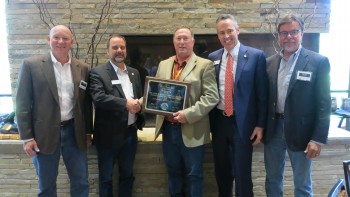(The Mining Claim, June 2016) – Bentonite producer Wyo-Ben is the 2016 winner of the Interstate Mining Compact Commission (IMCC), the Kenes C. Bowling National Mine Reclamation Award in the non-coal category. Named after the late charter executive director of IMCC, the awards were established to recognize outstanding achievements in reclamation and to promote reclamation on a national level. Each year there are two awards presented: one for coal and another for non-coal minerals. Competition for the awards is limited to IMCC states with each state authorized to make one nomination in each category. To be eligible, a mining company must have been actively mining and/ or reclaiming the site during the 12-month period prior to the nomination.

Pictured (L-R) Rick Magstadt (Wyo-Ben), Kyle Wendtland (WDEQ-LQD Administrator), Dale Nuttall (Wyo-Ben), Wyoming Secretary of State Ed Murray, and David Brown (Wyo-Ben)
The IMCC Awards Program is intended to identify and recognize companies and individuals who maintain compliance with regulatory requirements and apply innovative techniques to reclaim land following mining activities. Through these awards, the IMCC commends companies that have taken extra efforts to implement techniques which protect people and the environment from any adverse effects of mining, while at the same time allowing access to minerals that are vital to our nation’s economy and the well-being of our society.
As a common reclamation practice, Wyo-Ben contours overburden to match surrounding topography during the reclamation process. The company took extra time and incurred extra expense in order to establish reclaimed topography that matches the surrounding lands. This resulted in varied topography establishing microenvironments that aid in the establishment of varied and desired native vegetation, provision of varied habitat for wildlife that use the area, a more aesthetically appealing landscape for recreational visitors, and it allows for the creation of stable, meandering reclaimed drainages that ecologically tie into native drainages. Where deep drainages occurred in a mining area, even though it would be more economical to mine through the drainages rather than stopping the mining process and starting again on the other side, Wyo-Ben chose to take the more expensive route of avoiding the drainages for ecological purposes. In some instances where drainages were mined, rocks were placed in the reclaimed drainages for stabilization.
Using the castback mining technique, Wyo-Ben was able to reestablish several native perennial forbs and shrubs from residential soil seed. Wyo-Ben also routinely separates topsoil from subsoil that is of poorer quality relative to vegetation establishment. Subsoil, and when available other deeper growth medium, are spread first on contoured overburden in preparation for seeding. Topsoil is then spread on top to prepare the best possible environment for vegetation establishment. This practice, when combined with the other techniques utilized, led to successful establishment of vegetation and resulted in excellent vegetation cover at the reclaimed pit.
Lands prepared for seeding were seeded each fall, and occasionally in the early spring, with a mostly native seed mix containing a variety of grasses and shrubs. Seeding was completed using a Pitter-Broadcast Seeder that produces a series of one foot by one foot dimension pits into which seed is broadcast. This method results in microenvironments being created that provide many benefits to seed germination and vegetation establishment. Each pit is a small water collection area that provides more water to the seeds in the pit than if they were sitting on a flat seedbed, which is a great advantage in the arid environment. The configuration of the pit also acts as a soil trap, collecting wind-blown soil from the air and depositing it on seeds, which provides cover and a seed-soil contact situation. The water holding capacity of the pits reduces soil erosion from water runoff.
Wyo-Ben, Inc. uses drill trucks to determine the quality for bentonite pre-mine during exploratory drilling. This allows the company to reduce its disturbance footprint by avoiding the unnecessary mining of bentonite that will not meet quality standards. It also allows Wyo-Ben to leave undisturbed areas where drilling has determined that mining should not occur. Leaving native islands provides a native seed source for surrounding reclaimed lands, aids in the stabilization of reclaimed lands, and adds to the aesthetics of the reclaimed pit. The combination of practices used by Wyo-Ben to reclaim can also be utilized by other mining companies in the intermountain west where climatic conditions create challenges to successful mine reclamation. The result of these practices is reclaimed land that is supporting the pre-mined land uses of wildlife habitat and livestock grazing.
Wyo-Ben exemplifies the commitment of all Wyoming miners to good stewardship and excellent reclamation.
